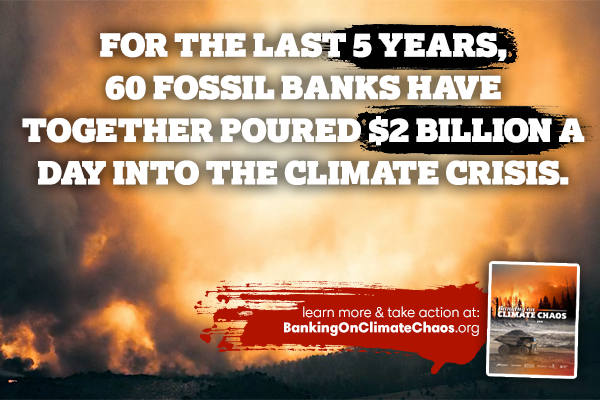Rainforest
Action Network (RAN) komt met een mailactie voor de 6 grootste
banken die de klimaatverandering financieren, ondanks dat deze banken
en 54 kleinere banken de ‘Net zero by 2050’ hebben getekend doen ze
daar in de praktijk niets mee, sterker nog ze investeren nog steeds
in fossiele brandstoffen……
De
grootste banken die RAN noemt zijn: JPMorgan Chase, Citi, Wells Fargo, Bank of
America, Royal Bank of Canada, and MUFG.
Lees endoe ajb mee aan de mail actie van RAN, binnen 1 minuut gebeurd! (en geeft het
door, het is in ons aller belang en vooral die van de volgende generaties, wellicht jouw kinderen en kleinkinderen)
BREAKING: We’re naming the world’s worst banks
Alison
Kirsch – Rainforest Action Network
BREAKING! Hot off the press:
Our annual report is exposing the world’s biggest banks for
directly bankrolling the climate crisis.
What did we find? Big banks are still fueling the flames of the
climate crisis.
The numbers are in. In just the last 5
years, 60
banks have poured $3.8 trillion into fossil fuel financing that’s
wrecking the climate, violating Indigenous rights, and fueling forest
fires around the world.
Climate chaos is escalating fast, and
our report proves that big banks aren’t putting their money where
their mouths are – they’re putting their money into dirty fossil
fuels instead!
We’re running out of time to prevent
runaway climate chaos. This November, world leaders will meet for the
UN climate conference in Glasgow, Scotland to make commitments to
accelerate climate action. But just three months into 2021, we’ve
exposed that while many big banks have made climate commitments on
paper, their actions have fallen far short. $3.8 trillion SHORT of
aligning with real climate action.
We
need your help to put pressure on the worst of the worst in fossil
fuel financing, Willem.
JPMorgan Chase, Citi, Wells Fargo,
Bank of America, Royal Bank of Canada, and MUFG are the top six
bankers of climate chaos, accounting for more than 33% of fossil fuel
financing from 60 banks. These banks are raking in a profit from
bankrolling fossil fuels, deforestation, and human rights abuses.
We’ve got news for them: Any
bank that makes a “net zero by 2050” commitment and continues
with business-as-usual fossil financing is greenwashing.
We don’t need vague promises about what banks might do in 30 years
— we need to see meaningful climate action NOW. Because we can’t
wait 30 years to stop burning fossil fuels!
Big banks have to step up and switch
from bankrolling climate destruction to financing the green economy
we need. And we need to see EACH of these 6 banks make those
commitments before the UN climate conference this November.
With YOUR help, we can move these
banks and create a better future for our climate. Tell
the CEOs of the six worst fossil fuel banks that their lack of
climate action won’t cut it, they must make a plan to phase out all
fossil fuel financing for good.
It’s time for big banks to clean up
their act and their path of climate destruction.
For a liveable climate,
Alison
Kirsch
Lead Researcher
Climate and Energy Program
Rainforest
Action Network
=======================================
Zie ook: ‘De meting van de luchtkwaliteit in de EU wordt eindelijk bijgesteld naar meer gezonde niveaus‘ (was dat maar waar: lees het bericht!!)
‘Shell toont andermaal aan lak te hebben aan duurzaamheid met aanstelling van mijnbouwschoft Mackenzie’ (en zie de links in dat bericht!!)
‘Op Facebook worden gebieden in het Amazonewoud verkocht‘ (en zie de links in dat bericht!!)
‘Een
meer dan 1.400 km lange oliepijpleiding in Oost-Afrika een gevaar voor
meer dan 30 miljoen mensen, een enorm aantal dieren en kwetsbare natuur‘ (waarin Total een belangrijke en smerige rol speelt….)
‘Halve graad opwarming van de aarde zal 150 miljoen mensen het leven kosten……‘
‘‘Brekend nieuws’: Rutte (VVD premier) stelt bedrijfsleven gerust wat betreft de energietransitie‘
‘Fossiele brandstoffen-maffia krijgt Corona-subsidie‘
(alleen in Nederland krijgt deze maffia al 8,3 miljard aan subsidie op
jaarbasis en dan noemt men Rutte 3 het meest groene kabinet ooit…..
ha! ha! ha! ha!)
‘Milieudefensie: ‘Nederland sponsort fossiele industrie met 8,3 miljard euro per jaar’‘
‘Fossil Fuel Industry Has Spent Nearly $2 Billion on Lobbying to Kill Climate Laws‘
(een artikel van OilChange, in de periode van 2000 tot 2016 gaf de
fossiele brandstof maffia 2 miljard dollar uit aan lobby tegen
klimaatwetten, geld wat ze met gemak kunnen betalen van de overheidssubsidies die ze krijgen, moet je nagaan…..)
‘Bossen in Duitsland: nog maar 28% van de bomen is gezond, de rest is ten dode opgeschreven…..‘ (en zie de links in dat bericht!!)
‘CO2 gehalte in atmosfeer hoogst in 800.000 jaar…… ‘Leve de klimaatverandering!’‘
(met als toevoeging een deel uit de tekst voor schooltelevisie over CO2
en dat we dit broeikasgas juist nodig hebben voor planten en bomen >>
lezen mensen, zo worden onze kinderen besodemieterd zodat ze niet aan
initiatieven als Fridays For Future meedoen…..
‘Ralph Hamers: ING belegt ‘nog maar’ voor 4 miljard in fossiele brandstoffen…… ha! ha! ha! ha! ha!‘


